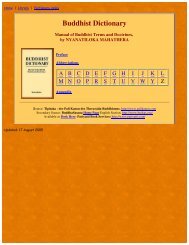Night and Morning with Bhikkhu Tissa
Night and Morning with Bhikkhu Tissa
Night and Morning with Bhikkhu Tissa
- No tags were found...
You also want an ePaper? Increase the reach of your titles
YUMPU automatically turns print PDFs into web optimized ePapers that Google loves.
<strong>Bhikkhu</strong> <strong>Tissa</strong>: That’s right. And since all phenomena are not permanent, the craving to exist permanentlymust lead to grief. We want to last forever, but whatever mental <strong>and</strong> physical factors we take to be our “self”are changeable <strong>and</strong> temporary <strong>and</strong> sure to let us down. We can’t find any real ego or essence in the dynamicprocesses of life. This is the great fact of anattá or non-self, on which the Buddha laid much stress. Now then,the third kind of craving is vibhava-taóhá, craving for non-existence or annihilation. It also is founded onignorance, on not seeing reality as it is.Gene: So all three kinds of craving produce suffering. I think I have the idea. Sensual pleasures—well, Iunderst<strong>and</strong> them, at least in theory. They are always mixed up <strong>with</strong> some degree of trouble or pain, <strong>and</strong> inany case they don’t last; they fade away <strong>and</strong> leave regret. And craving for eternal existence seems like just theperpetuation of the miserable delusion of self, <strong>with</strong> all the suffering that that involves. And craving for nonexistencesurely would be trouble, too, because you can’t annihilate a self that you can’t find in the first place!<strong>Bhikkhu</strong> <strong>Tissa</strong>: And you can’t escape from suffering <strong>with</strong> such a desire. You can’t stop the momentum ofcraving <strong>with</strong> more craving. The result of craving is suffering in its many forms, as we’ve discussed. So, toeliminate suffering, to attain true happiness <strong>and</strong> peace <strong>and</strong> freedom, we have to eliminate craving throughwisdom. That is what the Buddha did. The third Noble Truth is the truth of the cessation of suffering—thesupreme deliverance which is realized when craving is finally conquered.Gene: But to know how to do that is so difficult. And then there is the problem of knowing if one has theability….<strong>Bhikkhu</strong> <strong>Tissa</strong>: Ability isn’t a static thing. All the characteristics <strong>and</strong> tendencies that make up yourpersonality are continually changing according to your actions <strong>and</strong> your reactions to experiences. You havecertain skills <strong>and</strong> abilities now that you once didn’t have. They came to be because you disciplined yourself<strong>and</strong> made efforts <strong>and</strong> practiced.Gene: That’s so, but as for spiritual ability….<strong>Bhikkhu</strong> <strong>Tissa</strong>: The same principle holds true. Through repeated, intelligent effort you gain strength <strong>and</strong>skill. Through bad habits <strong>and</strong> carelessness you grow weaker.(The rain, which had been slashing against the windows, has slackened noticeably. The thunder now sounds from theeast, not so loud as before. The brief storm seems to be passing over. Gene falls silent for a moment, pondering. Then herouses himself.)Gene: You know, that dragonfly—maybe I was rash to consider it hideous. Maybe it was just ambiguous—sort of both good <strong>and</strong> evil—just a striking symbol of the contradictions in life.<strong>Bhikkhu</strong> <strong>Tissa</strong> (smiling): Oh?Gene: Well, it could be. Beautiful, powerful, yet utterly instinctive <strong>and</strong> ignorant. A creature of saísára! Or… does this sound far-fetched?<strong>Bhikkhu</strong> <strong>Tissa</strong>: Let’s say rather that we can find provocative ideas in dragonflies or any objects of ourexperience. But there’s no end to speculation, <strong>and</strong> speculation won’t free us from suffering. We need a clear,dispassionate view.Gene: How can we get that?<strong>Bhikkhu</strong> <strong>Tissa</strong>: By training ourselves to note just what actually appears to us. The Buddha said that inwhat is seen there should be only what is seen; in what is heard only what is heard; in what is sensed onlywhat is sensed; <strong>and</strong> in what is thought or cognized only what is thought or cognized. That is the way to cut offthe wild overgrowth of concepts.Gene: Does that mean we should try to see things just as they are, <strong>with</strong>out injecting our opinions?<strong>Bhikkhu</strong> <strong>Tissa</strong>: Yes. But it’s not easy, is it? We are so used to making mental connections <strong>and</strong> building upgreat complexities of imagination that we become confused; we imagine more than is really there. And what isthere we miss.Gene: I don’t underst<strong>and</strong> exactly.<strong>Bhikkhu</strong> <strong>Tissa</strong>: Let’s take a hypothetical case. Suppose that somebody you don’t like should walk into thisroom now. What would happen in your mind?10
















